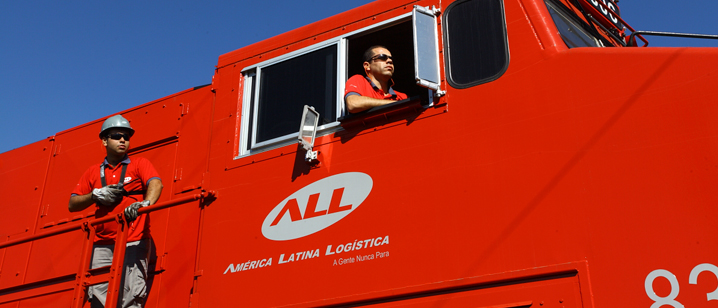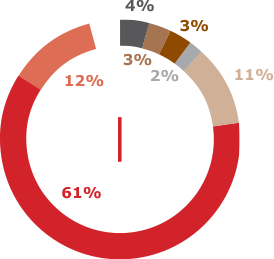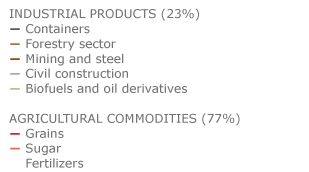Customers

Service quality
The quality of services provided for customers is, at the same time, a commitment and a challenge for ALL. In 2013, the company adopted a series of systematic measures to guarantee partnerships based on the transparent exchange of information, the clear definition of roles and the principle of co-responsibility.
One of the actions was to enhance services, with mechanisms that enable the daily tracking of activities and the rapid correction of operational deviations that jeopardize the fulfillment of work contracts by either party. The commercial area implanted a continuous assessment routine to map opportunities for improvement in areas such as service quality, communication and business management. Customers are invited to participate in monthly meetings with a previously defined agenda, the main objective of which is to analyze the productivity of the logistics service. This meeting is recorded in minutes and generates action plans, whose status is monitored until completion of the plan.
As a direct result of this exchange of information, ALL programmed a daily routine to reconcile responsibilities between company and customer areas and share performance indicators. Based on the understanding that joint solutions tend to be more efficient and faster, this helped bring about a step change in relations with numerous company customers in 2013.
The work, which began with a review of the respective responsibilities of ALL and its customers, and of both in relation to the ideal functioning of the logistics operation, included a painstaking assessment of opportunities to improve infrastructure in the customer's facilities. In one case, the action plan led to a joint investment of around R$ 7.5 million for the refurbishment of locomotives, the construction of a small railcar repair workshop and the expansion of two rail terminals – increasing their capacity from three to 20 railcars and from six to 18 railcars respectively, resulting in gains for the customer in loading and unloading processes –, among other improvements.
Customer Portfolio
By type of cargo


Real-time information
Upon realizing that 65% of the company's customers complained about lack of information on the precise location of each rail car, ALL implemented an on-time tracking system. With this new program, instead of receiving information about the position of freight on a daily basis every morning, customers can track every stage of the logistics process for their cargos online, 24 hours a day, and be aware of the number of vehicles scheduled for their loads and any possible occurrences.
The information may be accessed by CAALL Online, the ALL Service Center portal, which also permits customers to track data on occurrences, indemnities and insurance. During working hours, customers may also access the telephone call center CAALL. Via a toll-free 0800 number, the center provides information and answers enquiries and complaints, which are recorded, receive a protocol and are forwarded to the relevant area for solution, with predetermined response times.
Another advance was the integration of the CAALL center and a customized CRM (Customer Relationship Management) tool, which records all interactions between the center and company customers. This helps to streamline services, making management of the contacts received more transparent.
An important source of information in relationship management is the annual ALL Customer Satisfaction Survey, which gauges customer perceptions on questions such as ease of communication, efficiency of terminals, quality and suitability of assets, delivery times and flexibility to handle special conditions. Based on the improvement opportunities identified in the survey, the company drafts actions plans for the following year.
In 2013, more than 80 initiatives were undertaken, and the changes adopted helped to enhance services and improve customer perceptions. For 2014, ALL aims to achieve 7% growth in the weighted score among different customer groups in comparison with the previous year.
The survey is conducted in partnership with the Instituto Ilos, by means of telephone contacts with a list of customers defined by the company. In 2013, 90 customers were surveyed.
Strategic partnerships
With the consolidation of ALL's position in the agricultural commodity sector – an area that traditionally accounts for the operation's largest volumes –, the company developed a strategy to increase market share in the industrial products segment. ALL's investments in developing customer relations resulted in a number of records being broken. The following areas were worthy of note during the year.
Pulp – From January to October 2013, growth in the transportation of pulp produced by Eldorado Brasil and Fibria increased from 55,000 to 160,000 metric tons per month, or 189%. This is projected to increase even further in 2014, with the transportation of around 1.5 million metric tons of the product to the Port of Santos. This growth is the result of the consolidation of production at the Eldorado plant, which was inaugurated in Três Lagoas (Mato Grosso do Sul) at the end of 2012, together with the production from the Fibria operation, which has existed in the same municipality since 2009. The operation will become even more important in 2015, when the new Klabin factory in Ortigueira (Paraná) comes into operation, with the potential to increase pulp volume by 880,000 metric tons per year. Together, the projects total more than 2.4 million metric tons/year. In 2015, this volume should account for 19% of all Brazilian pulp production and 27% of the country's pulp exports.
Fuels – In the development of strategic partnerships to position rail transportation as the main logistics alternative for fuel imports, ALL formed an association with Cattalini Terminais Marítimos to begin transporting fuel from the Port of Paranaguá to Curitiba, Maringa, Londrina and Guarapuava, in the state of Paraná, as well as Passo Fundo (Rio Grande do Sul) and Ourinhos (São Paulo).
The two companies initiated the operation of a terminal with a storage capacity of approximately 400 thousand m3 in partnership. R$ 10 million was invested in the terminal, which will have 18 rail car loading stations, enabling the throughput of 30 million liters per month. The operation, the first in Brazil to use rail transportation to distribute imported fuel, has a dedicated fleet of 260 tanker cars and will drive a 20% increase in rail freight volume in these regions.
As part of this strategy, biodiesel was incorporated into the portfolio of liquid cargoes handled by ALL, with an initial volume of 67,100 m3 transported in 2013. The initial focus on the domestic market was expanded from the third quarter of the year, with the start up of operations to transport cargos for exportation. The operation is the result of a partnership between ALL, BsBios (biodiesel producer) and BR Distribuidora and involved investments of around R$ 1.3 million.
Another joint project is under development with the company Raízen, involving the creation of an ethanol export terminal, the only one in the state of São Paulo, which is the country's largest exporter of this fuel. Around 300 ALL rail cars carry the product to the Port of Paranaguá (Paraná). Freight capacity is more than 60 million liters of ethanol per year.
